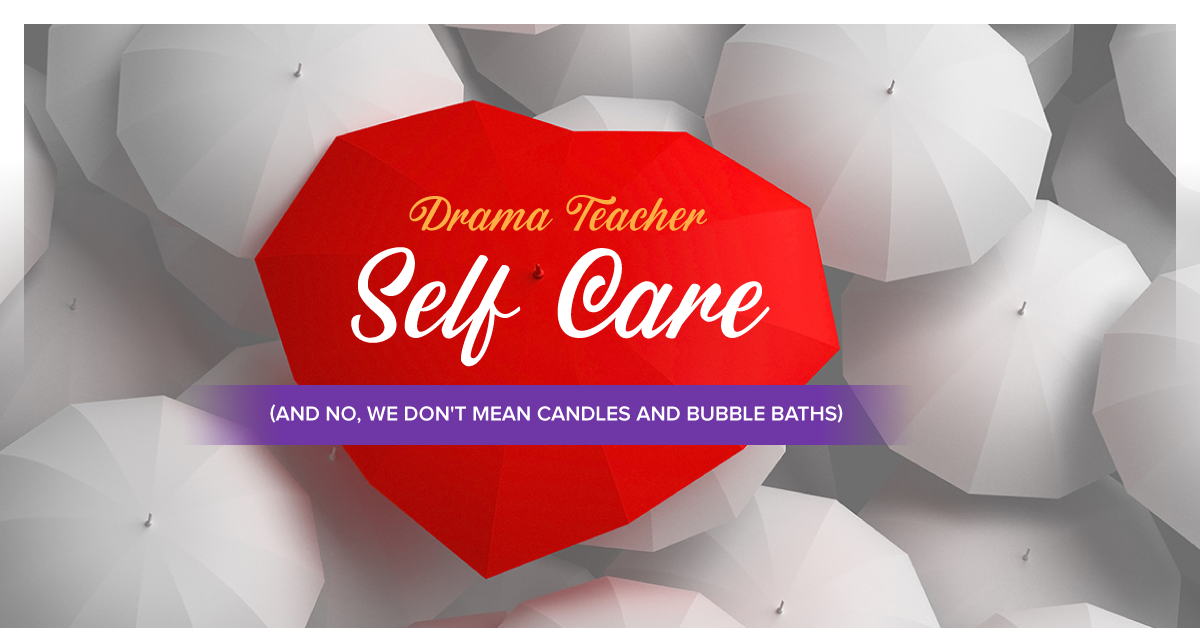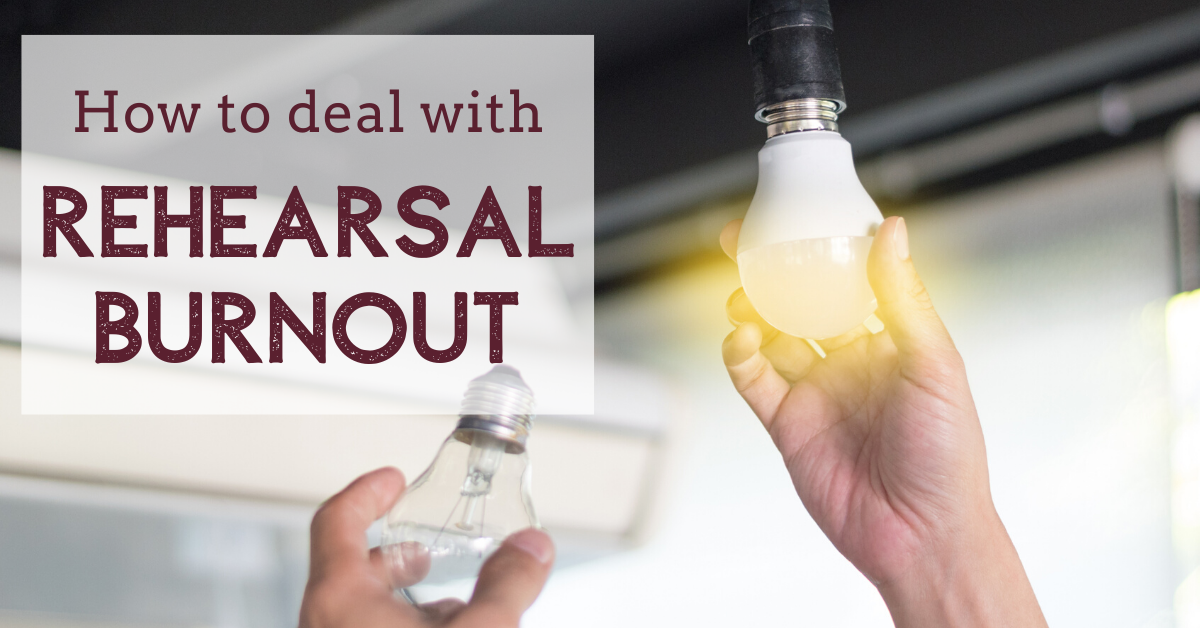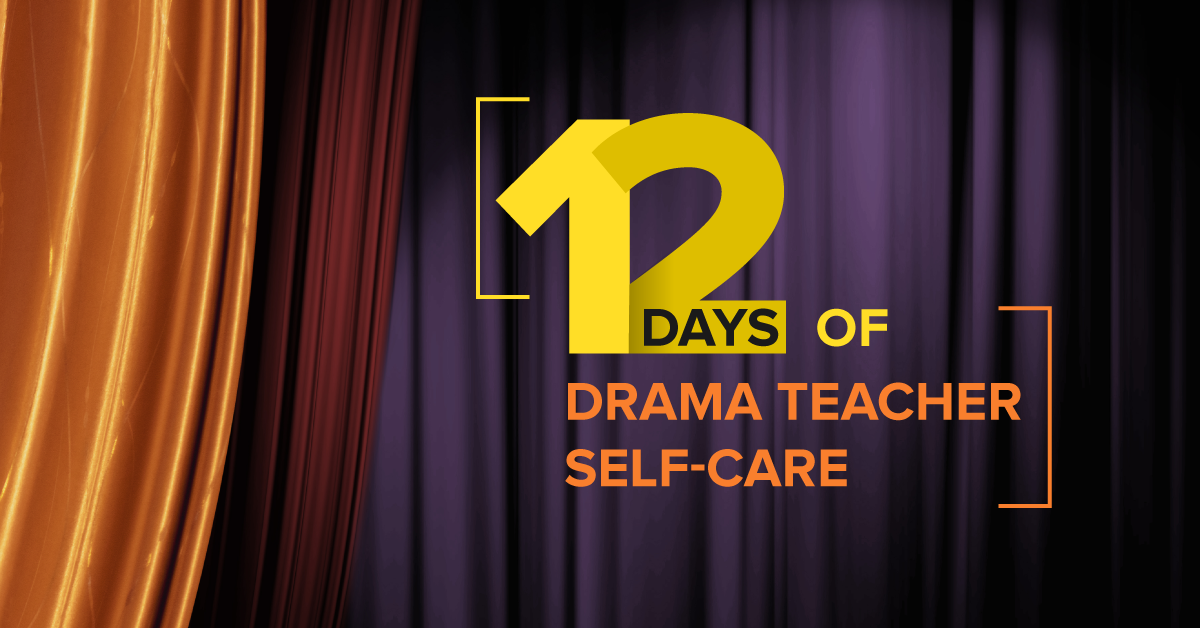Drama Teacher Self-Care (And No, We Don’t Mean Candles and Bubble Baths)
The term “self-care” is often met with eye-rolling and sarcastic laughter. We equate self-care with basking in a Jacuzzi with a fancy drink, taking a luxury cruise, or “treating yo’self” with a shopping spree. We’re drama teachers – we don’t have time for that!
However, we must re-frame our thoughts about self-care, and make it a daily practice. Self-care is vital to our day-to-day lives, and without it, we end up exhausted, burnt out, or sick. Without self-care, we are no good to anyone else. Here are some important things to consider about self-care:
1. Self-care is both proactive and reactive.
Proactive self-care involves taking care of yourself before you end up sick or burnt out. This includes listening to yourself and being aware of personal cues that may indicate that you’re heading towards burnout. For example, you might feel tension in your body, have a headache, feel your heart racing, get sweaty or clammy, or start snapping at your loved ones. Everyone has different cues. If you notice you are experiencing these cues, that’s an indication that you need to pause and give yourself some care before things get worse.
Reactive self-care involves doing things to help yourself heal once you’ve noticed that you are stressed or unwell. Making proactive self-care a part of your daily life can reduce the amount of reactive self-care you’ll need.
2. Self-care is not selfish.
You deserve to be treated well, not only by others, but also by yourself. This can be hard for teachers to accept because we give a lot of ourselves to our students, administrators, friends, and family members. Sometimes it seems like there’s nothing left over for us. We tend to just keep pushing through, skipping meals and staying up late to get everything on our to-do lists completed, until we are exhausted. Would you treat a valued friend this way – cracking a metaphorical whip and pushing them to the brink? Then why would you treat yourself that way?
If you’re still not sold, consider this. If you’ve ever been on an airplane, in case of emergency, the flight attendants instruct you to put your own facemask on before helping others. As drama teachers, we stretch ourselves to the limit to create interesting and engaging lessons, learn about new technology and distance teaching methods, and do everything under the sun related to producing shows, reading new scripts, and being there for our students. But we cannot adequately do our jobs if we do not take care of ourselves. You cannot serve others from an empty plate, and you cannot give more and more of your time, energy, and talents when you have not cared for yourself first.
3. The act of self-care is a practice.
Just like you have your students practice skills they’ve learned in the drama classroom, self-care is also a practice. Because we have smartphones and tablets and are always connected to the Internet, we are encouraged to always be available and ready to jump into action. It can be hard to slow down and take time to care for ourselves. There will be times when you forget. When that happens, be gentle with yourself, and do some reactive self-care. As with any skill, practice makes progress.
It’s important that your students see you practicing self-care as well. Actions always speak louder than words, and modeling self-care will help your students practice it themselves.
4. Re-frame your thoughts about self-care.
We joked about candles and bubble baths, and while they’re great and certainly can be included in your self-care practice, there are lots of other things that can be considered self-care. Think of things you can do now that will help you avoid burnout in the future. It doesn’t need to be expensive or time-consuming. Little acts of self-care add up to great results, and your Future Self will thank you.
Self-care tasks can include:
- Making freezer meals that you can easily thaw and defrost during tech week when you don’t feel like cooking, or arranging a meal service if it’s in your budget
- Taking on an assistant director, director’s assistant, production assistant, and/or department heads for your next show, so you don’t have to do everything yourself
- Learning about mindfulness and wellness exercises that can be adapted for the drama classroom, and practicing with your students
- Keeping a fun water bottle on your desk at all times that you enjoy drinking from to stay hydrated
- Turning off notifications on your cell phone after a certain time at night, so you aren’t being bugged all the time by emails (let your students and administrators know that you won’t be replying to messages after certain times, and force yourself to stick to that time!)
- Writing down your accomplishments and your students’ accomplishments in a journal or on post-its, and re-reading them when you’re feeling down



